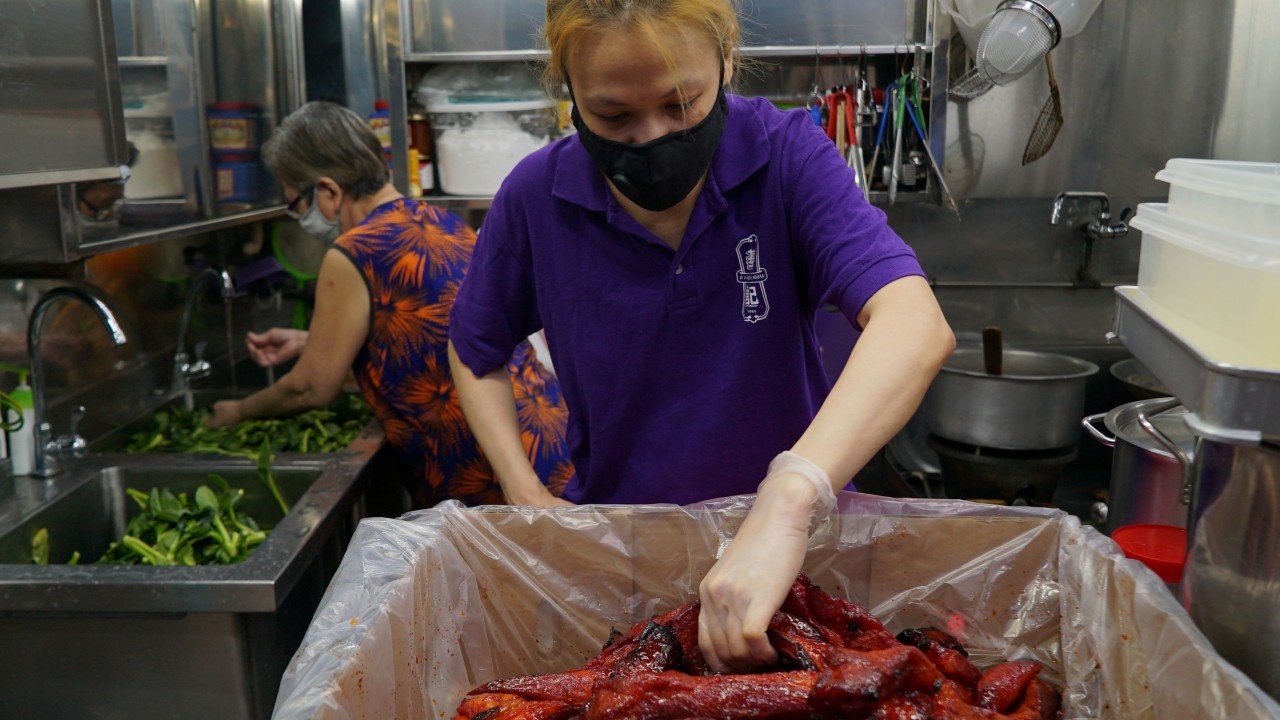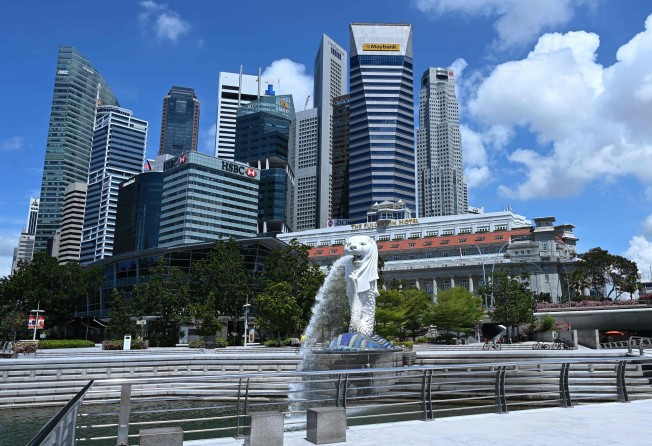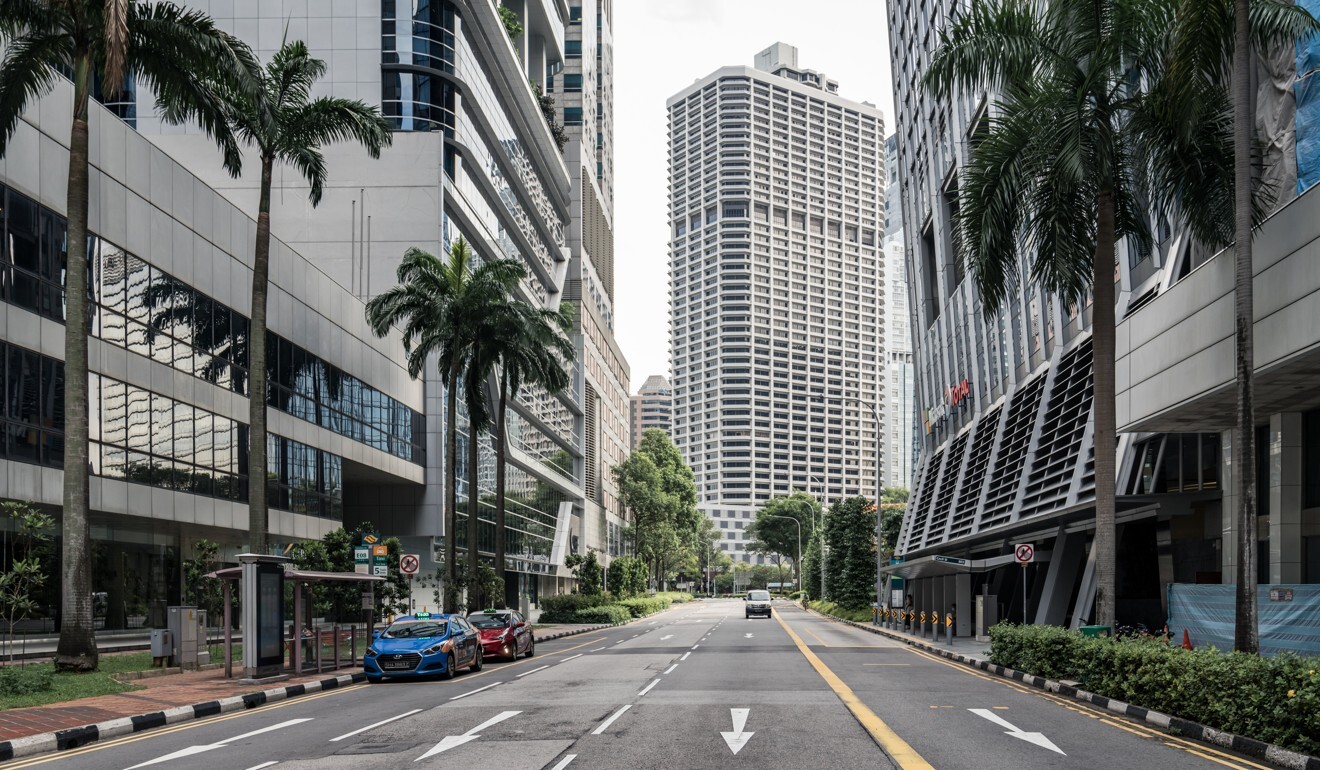
02:13
‘Last-generation’ Singapore hawker fights to weather pandemic

Singapore’s trade ministry on Tuesday predicted the bellwether economy could shrink by up to 7 per cent, a level not seen since it gained independence as signs mount of a slow road to recovery from the coronavirus recession amid concerns of future waves of the pandemic.
The city state’s growth forecast now stands at a range of -7.0 per cent to -4.0 per cent, down from the official prediction of -4.0 to -1.0 per cent in March.
Singapore’s US$354 billion economy – often scrutinised as an indicator of economic health in Asia – last experienced a full-year contraction in 2001, when growth fell by 1.1 per cent in the aftermath of the dotcom bust.
The latest forecast range puts the country on course to its worst recession since the 3.2 per cent contraction it experienced in 1964, a year before it separated from Malaysia to become an independent nation.
In the 1998 Asian Financial Crisis it shrank by 2.2 per cent. In 2009 – at the height of the Great Financial Crisis – the republic’s economy grew by 0.1 per cent even though the official forecast was in the -9 to -6 per cent range.
Figures released on Tuesday showed the economy shrank by 0.7 per cent in the January to March quarter, an upwards revision from earlier flash estimates that put the figure at -2.2 per cent on a year on year basis.
“There remain significant uncertainties in the global economy. First, there is a risk that subsequent waves of infections in major economies such as the US and euro zone may further disrupt economic activity,” the Ministry of Trade and Industry said in a statement.
“In particular, if infections start to rise and strict measures such as lockdowns and movement restrictions are reimposed, the downturn in these economies could be more severe and prolonged than expected,” it said.

02:13
‘Last-generation’ Singapore hawker fights to weather pandemic
Singapore’s Manpower Ministry warned it expected labour market conditions to worsen later this year, citing “considerable uncertainty” around the pace of reopening of economies around the world.
“We do expect that the labour market conditions will deteriorate and we have to be prepared for a rise in retrenchments,” a spokesperson said, according to broadcaster Channel NewsAsia.
The economic fallout from the coronavirus pandemic has affected countries around the world. Indonesia, for example, slashed its growth forecast last month by more than half to 2.3 per cent, while Thailand cut its official forecast to a -6 to -5 per cent range.
Singapore, which has more than 31,000 coronavirus cases, is looking to slowly reopen its economy starting June 2 even though its infections continue to climb, most of whom are low-wage migrant workers living in dormitories. The city state has been under a partial lockdown, or a so-called circuit breaker, since April 7, which saw most schools and workplaces shut.
Authorities said the three-phase resumption of economic activity would be cautious, with the first batch of workers from “critical, low-risk” sectors, such as those from manufacturing and production, finance and insurance, as well as transport and storage. This is expected to take a few weeks, and the second phase would take months, seeing more restrictions governing social activities being relaxed.
Analysts said contraction in the second quarter will be particularly grim, as the effects of the two-month partial lockdown are laid to bare. Key sectors such as tourism, electronics manufacturing and retail slowed to a crawl during the lockdown as most businesses were ordered to suspend work.
The government has said only about 15 per cent of the country’s 2.4 million workers were still commuting to work amid the tightened measures. In sectors such as financial and insurance services – which make up 13.9 per cent of the economy – most employees have been working from home.

Selina Ling, OCBC Bank’s head of treasury research and strategy, predicted a double-digit contraction in the April-June quarter. HL Bank senior treasury strategist Jeff Ng forecast a 20 per cent contraction in the same period.
Ng said he was hopeful of a “strong rebound” in the third quarter even amid a “fluid” situation, citing “sky-high” production in the pharmaceutical sector. Tuesday’s data showed the country’s manufacturing sector grew 6.6 per cent in the first quarter compared to last year, buoyed especially by the biomedical sector. This reversed three straight quarters of contraction.
The trade ministry in its statement identified the biomedical manufacturing sector as among “the pockets of resilience in the Singapore economy”, adding that it expected the sector to continue to expand as it is supported by production of pharmaceutical and biological products.
It said “outward-orientated sectors” such as manufacturing, wholesale trade, transportation and storage will be hard-hit by the economic slowdown in Singapore’s key trading partners.
It also highlighted how the construction and marine and offshore engineering sectors had been “severely affected by manpower shortages” due to the widespread Covid-19 infections in migrant worker dormitories.
Outlook for the accommodation and food services sector was also bleak. The sector fell by 23.8 per cent on an annualised basis in January-March, compared with 2.5 per cent growth in the previous quarter.
Ling, the OCBC analyst, said the three-phase reopening of the Singapore economy announced last week meant “any semblance of a full resumption of economic activities will only come towards the end of the year”.
“GDP growth may not return to positive territory until the fourth quarter of 2020, but the second quarter is likely to mark the bottom and the third should see a modest sequential improvement,” she said.
Help us understand what you are interested in so that we can improve SCMP and provide a better experience for you. We would like to invite you to take this five-minute survey on how you engage with SCMP and the news.